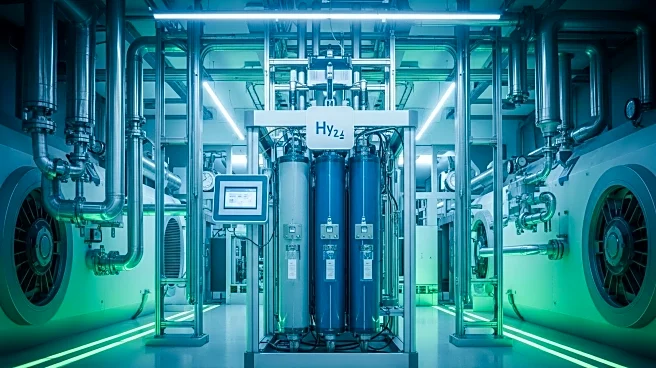What's Happening?
Hydrogen electrolyzers are becoming a pivotal technology in the global energy transition, particularly in Europe and the United States. These devices, which split water into hydrogen and oxygen using electricity, are essential for producing green hydrogen, a clean fuel alternative. The European Commission has set ambitious targets to install 40 GW of renewable hydrogen electrolyzers by 2030 within the EU, with an additional 40 GW in neighboring regions. This initiative is part of a broader strategy to lead the hydrogen economy and decarbonize heavy industries such as steel, chemicals, and refining. The U.S. is also investing in this technology through the Department of Energy's 'Hydrogen Shot' initiative, aiming to reduce the cost of clean hydrogen significantly. The global market for hydrogen electrolyzers is projected to reach $3,791.6 million by 2031, driven by technological advancements and policy support.
Why It's Important?
The deployment of hydrogen electrolyzers is crucial for achieving net-zero emissions by 2050, as they enable the production of green hydrogen, which can replace fossil fuels in various industrial processes. This transition is vital for industries that face challenges in reducing emissions through direct electrification. The cost reductions and efficiency improvements in electrolyzer technology make hydrogen a competitive energy source, potentially transforming industrial energy systems. The strategic integration of electrolyzers into renewable energy systems also offers grid stability and energy storage solutions. As industries adopt this technology, they can meet carbon reduction targets and secure sustainable feedstocks, enhancing their competitiveness and resilience in the global market.
What's Next?
The next decade is expected to see significant industrial adoption of hydrogen electrolyzers, with Europe and the U.S. leading the charge. The EU's commitment to 80 GW of electrolyzer capacity by 2030 and the International Energy Agency's projection of 520 GW globally suggest that electrolyzers could become mainstream industrial assets. Industries that engage early in pilot and scale-up projects will be well-positioned to benefit from this transition. However, challenges such as infrastructure gaps, regulatory harmonization, and supply chain readiness need to be addressed to facilitate widespread adoption.
Beyond the Headlines
The push for hydrogen electrolyzers also raises ethical and environmental considerations. The production and deployment of these technologies must be managed sustainably to avoid negative impacts on ecosystems and communities. Additionally, the geopolitical implications of hydrogen as a global energy source could reshape international energy markets and alliances. As countries invest in hydrogen infrastructure, they may gain strategic advantages in the emerging hydrogen economy, influencing global energy dynamics.










